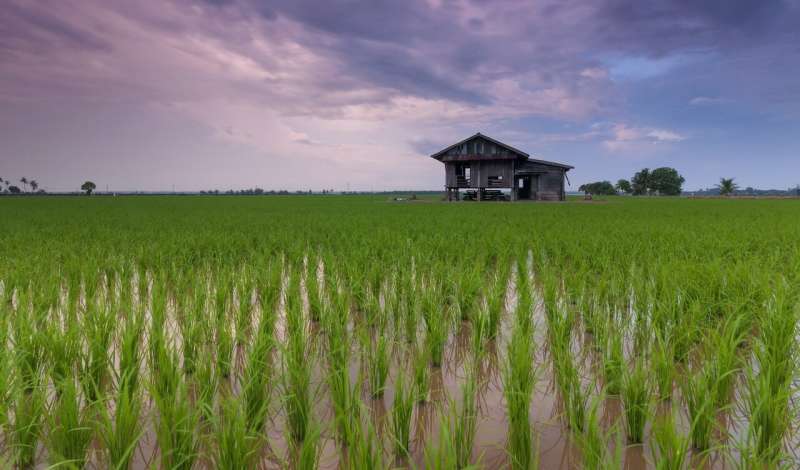Science
Global Rice Yields Plummet Due to Severe Flooding Threatening Food Security

Severe flooding has significantly reduced global rice yields, raising alarms over food security for billions who depend on this staple. Between 1980 and 2015, rice production saw an average loss of approximately 4.3%, translating to around 18 million tons of rice annually, according to a study from Stanford University published in Science Advances. This trend has intensified since the year 2000, driven by increasingly frequent extreme floods in key rice-growing regions, with climate change anticipated to exacerbate the situation.
While the agricultural community has long recognized the detrimental impact of droughts on rice yields, this research shines a light on the often-overlooked risks posed by flooding. The study indicates that droughts have historically reduced yields by an average of 8.1% annually over the same period. Yet, it is the flooding that presents a newly defined challenge. Although rice plants can tolerate some shallow flooding during early growth, prolonged submersion can lead to devastating losses.
Understanding Flood Impacts on Rice
The research team, led by Zhi Li, who previously worked as a postdoctoral fellow under Steven Gorelick, defined for the first time what constitutes a “rice-killing flood.” Their findings indicate that when rice crops are submerged for a full week, the likelihood of plant death significantly increases. “By defining ‘rice-killing floods,’ we have quantified how these specific events consistently destroy one of the most vital foods for over half of the global population,” said Li.
To evaluate the impacts of flooding and drought on rice yields, the researchers analyzed data on rice growth stages, annual yields, and a comprehensive dataset on global droughts and floods dating back to 1950. This analysis predicts that, in the coming decades, the most intense week of rainfall in major rice-growing river basins could be 13% greater than the average rainfall recorded from 1980 to 2015.
Strategies for Mitigating Future Losses
To counteract the potential for future losses, the study advocates for the increased adoption of flood-resistant rice varieties, particularly in regions most vulnerable to severe flooding. Areas such as the Sabarmati Basin in India, which experiences the longest duration of rice-killing floods, as well as North Korea, Indonesia, China, the Philippines, and Nepal, are identified as high-risk zones.
The findings highlight that the most significant losses have occurred in North Korea, East China, and West Bengal in India. Interestingly, the research also notes exceptions like the Pennar Basin in India, where flooding may actually enhance rice yields, potentially due to the rapid evaporation of stagnant water in hot, dry climates.
For researchers like Gorelick and Li, these findings underscore the urgent need to understand how rice yields respond to various environmental stresses, including floods, droughts, heat waves, and cold spells. Previous studies have indicated that cycles of alternating drought and flooding can cause almost double the yield loss compared to either event occurring alone.
As the global agricultural landscape continues to evolve under the pressures of climate change, understanding and mitigating these combined effects remains a significant challenge for food security worldwide.
For more detailed insights, refer to the study by Zhi Li et al., titled “Severe floods significantly reduce global rice yields,” published in Science Advances in 2025.
-

 Science1 month ago
Science1 month agoIROS 2025 to Showcase Cutting-Edge Robotics Innovations in China
-

 Science2 weeks ago
Science2 weeks agoUniversity of Hawaiʻi at Mānoa Joins $25.6M AI Initiative for Disaster Monitoring
-

 Lifestyle1 month ago
Lifestyle1 month agoStone Island’s Logo Worn by Extremists Sparks Brand Dilemma
-

 Health1 month ago
Health1 month agoStartup Liberate Bio Secures $31 Million for Next-Gen Therapies
-

 Politics1 month ago
Politics1 month agoJudge Considers Dismissal of Chelsea Housing Case Citing AI Flaws
-

 Lifestyle1 month ago
Lifestyle1 month agoMary Morgan Jackson Crowned Little Miss National Peanut Festival 2025
-

 World1 month ago
World1 month agoBravo Company Veterans Honored with Bronze Medals After 56 Years
-

 Health1 month ago
Health1 month agoTop Hyaluronic Acid Serums for Radiant Skin in 2025
-

 Science1 month ago
Science1 month agoArizona State University Transforms Programming Education Approach
-

 Sports1 month ago
Sports1 month agoMel Kiper Jr. Reveals Top 25 Prospects for 2026 NFL Draft
-

 Business1 month ago
Business1 month agoTruist Financial Increases Stake in Global X Variable Rate ETF
-

 Sports1 month ago
Sports1 month agoYamamoto’s Mastery Leads Dodgers to 5-1 Victory in NLCS Game 2







